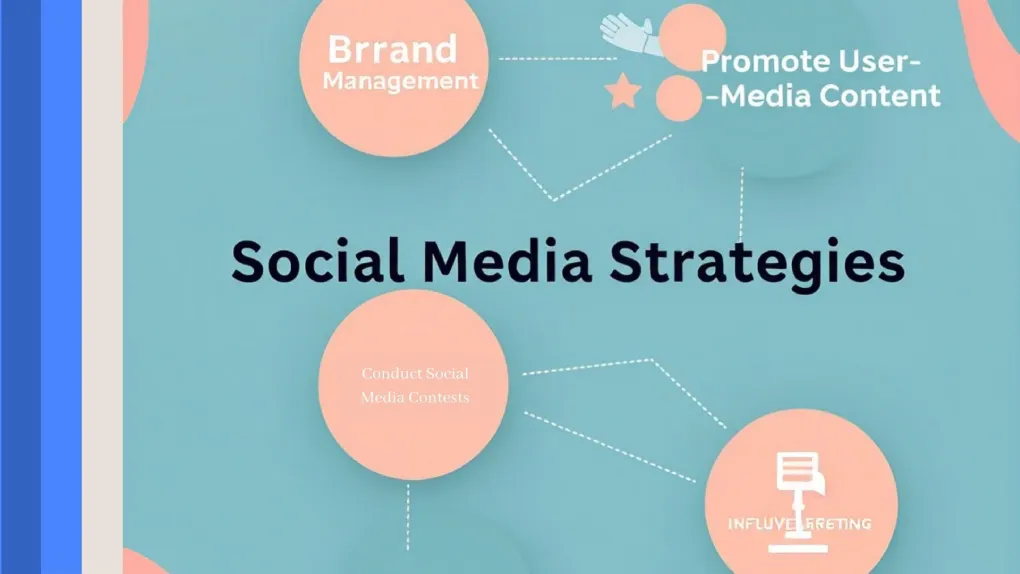Social networking sites enable individuals to communicate, share information and produce web content. There are various forms of social media, including blogs, micro-blogs, wikis, social networking sites, photo-sharing sites, instant messaging, video-sharing sites, podcasts, widgets, virtual worlds, and others.
Social media marketing is the use of social media websites and social media platforms to interact with your audience to build your brand, drive sales, and web traffic. It is the process of publishing with text and image posts, videos, and other content that drives user interaction.
What is social media marketing strategy?
A social media marketing strategy is an advanced strategy explaining how a business utilizes social media platforms in a bid to achieve certain goals, including awareness, engagement, lead generation, and ultimately sales.
- Key elements for social media marketing strategy
An effective social media strategy entails elaborate strategies, complete knowledge, and sophisticated tools. Ensure unlocking the below essential elements of a successful social media marketing strategy for your objectives:
1. Know Your Target Audience
Finding your target market is the foremost and most vital step. Define your target consumers, develop their persona, become familiar with their behavior, likes, and interests, and fashion your social media marketing plan in such a way that will attract them to you. Create captivating and relevant information from your discoveries. Build your buyer’s profile by conducting market research and analysis of the audience by using various keyword research tools through which you can study the demographics of target customers
2. Set Clear Goals
Before you can decide on a plan, you need to set sound and achievable targets that are coherent with your enterprise objectives. Those measurable objectives help you channel efforts towards creating quantifiable results. Moreover, your social media marketing campaign will stick to your business objectives, so you will not lose direction when working towards fulfilling your long-term objectives.
One of the best ways of setting goals is by applying the SMART criteria, meaning Specific, Measurable, Achievable, Relevant, and Time-bound. Also, set key performance indicators (KPIs) to track your progress.

3. Select the Appropriate Social Media Platform
There are a variety of social media sites, and marketing professionals need to choose the right ones based on where their target audiences are spending most of their time and consuming content. You can look at sites like Instagram, Facebook, LinkedIn, etc.
Every social media platform has a varying audience base and characteristics, hence strategically choose the social media platform. For instance, Facebook is used by adults between 50 and 64 years and Instagram or Snapchat is used by 18 to 29-year-olds. Hence, choose platforms that reach your target base in order to achieve maximum social media engagement.
4. Create Interesting Content
Now is the time to come up with a thorough content strategy to add value to the audience. Post high-quality, engaging, and relevant content that promotes diversity and consistency on all social media. Add nice-looking images and graphics to spice up your posts and build a loyal base of followers. Make interesting videos illustrating how your products work and add colored infographics to narrate a story about your company and brand.
Post frequently on your public channels and try different formats to build brand awareness and determine what works for your audience
5. Build Communities
To establish brand loyalty and trust, establish a strong social media following. Leverage your social media presence to build a positive following that increases your brand. Participate in user-generated content and get your users to share their comments on different social media platforms. This will involve the followers in content creation, drive organic content and traffic, and gain new customers.
Social media marketing strategies
1. Brand Management
Brand management involves building and managing social media pages with the purpose of interacting with people and making them aware of the brand. Brand management is a way of publishing useful content to the users, establishing trust, and obtaining followers on various media platforms such as Twitter and Instagram.
This approach literally uses social media to socialize with the target audience and reach out to them. Brands can go viral, have a positive reputation, and position themselves as a destination of choice for a specific product or service. Therefore, whenever a user needs your products, instead of Googling, they will go directly to your page or website to buy.
2. Promote User-generated Content
Coming up with engaging and innovative content daily for social media is tiring for marketers. But no longer. Get your customers and current users of your products to share their reviews on your social media sites via stories or posts. It is also referred to as user-generated content, an effective social media marketing tool which most top brands are leveraging.
Request your customers to share their reviews, testimonials, experience, videos, and images using the provided hashtags. This will not only engage the audience but also build customer trust and loyalty. You can develop a loyal customer base and build your social media presence organically.
Include user-generated content by way of contests, hashtags, and incentives. Interact with users and followers to facilitate participatory engagement.

3. Conduct Social Media Contests
We are all aware of social media contests these days, yet most marketers underestimate them while formulating social media campaigns. Contests are a proven social media marketing technique that boosts user involvement and fosters business growth.
This is one marketing technique that can work wonders if you need to gain followers and gain new users. It’s also a great opportunity to gain contact details of users and generate leads. Use reliable software or tools to run contests on your social media page.
Ask people to like your page or account to see the growth. The contest does not have to be highly complicated but require people to do simple and basic tasks, like sharing their photo with your product, using the given hashtags, or mentioning your brand.
4. Go Live
Companies are already using videos to engage with social media followers and tell their stories. However, it is time to push limits and provide your audience with the latest updates and activities as they occur. That’s where live videos come in. They are one of the most effective social media marketing tools for grabbing the attention of your potential buyers.
With Facebook’s algorithm changes, the social media site constantly nudges people to use the Facebook Live feature to its fullest. Such live videos get six times more engagement than regular videos. Additionally, the live videos in Instagram Stories have grown manyfold and stand at 300 million users.
5. Try influencer marketing
Only a few years back, influencer marketing was hardly employed by any companies in their social media campaigns. However, soon other companies found that they couldn’t mobilize social media users by themselves. They need an instrument to spread their message in order to achieve brand awareness and get momentum.
Thus, more business owners started embracing influencer marketing and collaborating with social media influencers. Because they already have a pre-existing audience that follows and trusts them, it can work wonders for your brand. Thus, making it one of the most powerful marketing strategies that can generate results at once and push sales
Conclusion
In general, social media marketing has various benefits for businesses regarding increased brand awareness, increased customer interaction, cost-effective advertisement, increased web traffic, and improved search engine position. Care, however, needs to be exercised against potential disadvantages such as invasion of privacy, dissemination of false information, and dissemination of misinformation.
FAQS
A social media marketing plan is a detailed marketing strategy that defines social media goals, target market, content plan, and how to accomplish business goals through media such as Facebook, Instagram, Twitter, LinkedIn, and others.
The key elements of a successful social media strategy are:
- -Identify Your Target Market
- -Set Clear Goals
- -Select the Appropriate Social Media Network
- -Create Engaging Content
- -Create Communities
- -Plan Your Social Media Schedule
- -Measure Performance
- -Invest in Social Media Tools
- -Identify the Budget and Resource
Yes, you can tailor social media marketing strategies to the unique characteristics, type of user, needs of the audience, and reach of each platform. You can adjust your posting frequency, content type, and engagement strategy to the strengths and user behaviors of each platform.
The most trending new social media trends are influencer partnerships, interactive and immersive content (e.g., AR filters), short-form video content (e.g., TikTok, Instagram Reels), greater emphasis on community building and authenticity, and social commerce.





